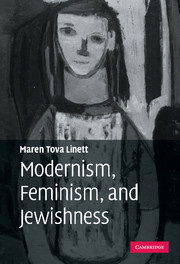Book contents
- Frontmatter
- Contents
- Acknowledgments
- List of abbreviations
- Introduction: imagined Jews and the shape of feminist modernism
- 1 “Strip each statement of its money motive”: Jews and the ideal of disinterested art in Warner, Rhys, and Woolf
- 2 Transformations of supersessionism in Woolf and Richardson
- 3 Adding bathrooms, fomenting revolutions: modernity and Jewishness in Woolf and Warner
- 4 The race must go on: gender, Jewishness, and racial continuity in Barnes and Richardson
- 5 The “No time region”: time, trauma, and Jewishness in Barnes and Rhys
- 6 Metatextual Jewishness: shaping feminist modernism
- Notes
- Works cited
- Index
5 - The “No time region”: time, trauma, and Jewishness in Barnes and Rhys
Published online by Cambridge University Press: 22 September 2009
- Frontmatter
- Contents
- Acknowledgments
- List of abbreviations
- Introduction: imagined Jews and the shape of feminist modernism
- 1 “Strip each statement of its money motive”: Jews and the ideal of disinterested art in Warner, Rhys, and Woolf
- 2 Transformations of supersessionism in Woolf and Richardson
- 3 Adding bathrooms, fomenting revolutions: modernity and Jewishness in Woolf and Warner
- 4 The race must go on: gender, Jewishness, and racial continuity in Barnes and Richardson
- 5 The “No time region”: time, trauma, and Jewishness in Barnes and Rhys
- 6 Metatextual Jewishness: shaping feminist modernism
- Notes
- Works cited
- Index
Summary
Imagined Jewishness sustains an elastic relationship to time. Within feminist modernism it can represent modernity, as it does in Summer Will Show (1936) and Between the Acts (1941); it can represent the past, and continuity with that past, as it does in Nightwood (1936) and Pilgrimage (1915–1967). And it can serve a further kind of temporal inquiry, as when Djuna Barnes and Jean Rhys use Jewishness to explore the phenomenology of timelessness. As I demonstrate in this chapter, Jewishness in Nightwood and in both Voyage in the Dark (1934) and Good Morning, Midnight (1939) comes to signal the timelessness attendant on psychological trauma.
Trauma gives rise to a sense of timelessness by distorting people's perception of time and continuity. A traumatic experience is “remembered” differently from ordinary events, in that it cannot be placed in time or located within a coherent sequence. One distinctive and defining quality of traumatic memories, therefore, is that they are temporally elusive. Cathy Caruth describes their position outside of time: “The history that a flashback tells – as psychiatry, psychoanalysis, and neurobiology equally suggest – is, therefore, a history that literally has no place, neither in the past, in which it was not fully experienced, nor in the present, in which its precise images and enactments are not fully understood.”
- Type
- Chapter
- Information
- Modernism, Feminism, and Jewishness , pp. 140 - 172Publisher: Cambridge University PressPrint publication year: 2007



